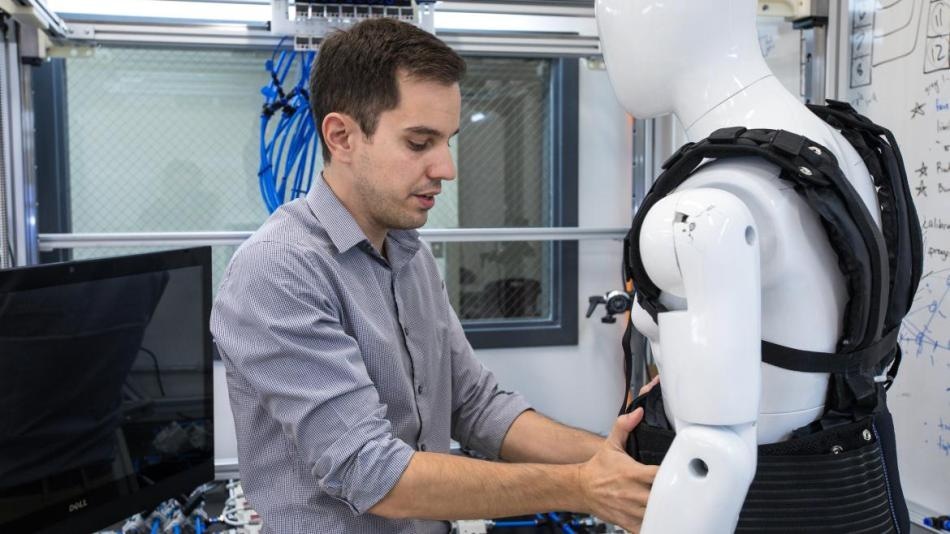Jun 19 2017
Therapists and physicians share challenges; engineering professor's class develops solutions, 3 of which are being patented
 ASU Assistant Professor Panagiotis Polygerinos demonstrates the Soft Robotic Back Orthosis device as he talks about innovative medical habilitation devices his graduate students at the Polytechnic campus' Ira A. Fulton Schools of Engineering created with the assistance of physicians and clinicians at the Barrow Neurological Institute, with support from VentureWell and AzTE. (Credit: Charlie Leight/ASU Now)
ASU Assistant Professor Panagiotis Polygerinos demonstrates the Soft Robotic Back Orthosis device as he talks about innovative medical habilitation devices his graduate students at the Polytechnic campus' Ira A. Fulton Schools of Engineering created with the assistance of physicians and clinicians at the Barrow Neurological Institute, with support from VentureWell and AzTE. (Credit: Charlie Leight/ASU Now)
In most classes, a good job results in an "A."
In Panagiotis Polygerinos’ mechatronics device class, a good job results in a patented invention that improves lives.
The Arizona State University assistant professor (pictured above) teamed his engineering students with therapists and physicians at Barrow Neurological Institute in Phoenix to create medical rehab devices.
Three of those devices are being patented.
“Now we have three provisional patents, we’re about to submit for a full application, we have three papers submitted, and who know what else will come?” Polygerinos said.
The class — EGR 598 Mechatronics Device Innovation — is entrepreneurship-based. Students learn how to move their inventions out of the lab and into the world as well as create them.
“The course is about how do you build a device from scratch?” Polygerinos said. “It takes a lot, but it’s worth it.”
Barrow medical professionals came up with about 15 ideas. The class chose three of them and went to work.
Video: See the Soft Robotic Back Orthosis in action.
After back surgery or recovering from a back injury, patients currently have to wear splints.
Splints result in “pressure points, fatigue to the skin, inability to perform in your everyday life because you are restricted,” Polygerinos said. “Now the idea was, can we create a device that is transparent to the user?”
The Soft Robotic Back Orthosis is a variably adjusting device, a network of webbing, straps and soft inflatable bladders that transmits loads and forces around. It protects the back and prevents wearers from movements that would aggravate their injuries.
Video: See how the Soft Robotic Shoulder Assist Device for Wheelchair Users works.
Patients who use wheelchairs develop shoulder pain from repetitively pushing the wheels. The Soft Robotic Shoulder Assist Device for Wheelchair Users gives a boost in pushing at the exact second it is most difficult. Results from experiments with a wheelchair test participant were promising.
People who use walkers tend to lean on them too much, contorting their backs and arms. Handles on the Biofeedback Walker vibrate when users put too much pressure on them. It’s a way of having a physical therapist constantly present, correcting their posture. Students are still developing the walker.
The three teams of four graduate students each were funded by a $2,500 budget from Venturewell, a nonprofit that funds and trains faculty and student innovators to create successful, socially beneficial businesses.
Arizona Technology Enterprises, ASU’s intellectual property management company, prepped students on how to bring inventions to market, providing lectures on intellectual property, marketing, licensing and startups.
As well as creating, designing, prototyping and evaluating, students have to write a publication-quality paper and submit it to a conference or journal.
“They have to submit a paper — not to me, that I would put in a drawer after I give them a grade — but they have to submit a paper at a conference,” Polygerinos said.
Instead of only working in the lab, Polygerinos wants to recruit and work with actual patients, to test devices on them, collect more data and prove prototypes work.
The course will be offered again in January 2018.
Projects don’t necessarily need to end with the course, Polygerinos said.
“If they are willing to continue, why not? I am here to help them to completion if they want and to make an impact on the real world,” he said.